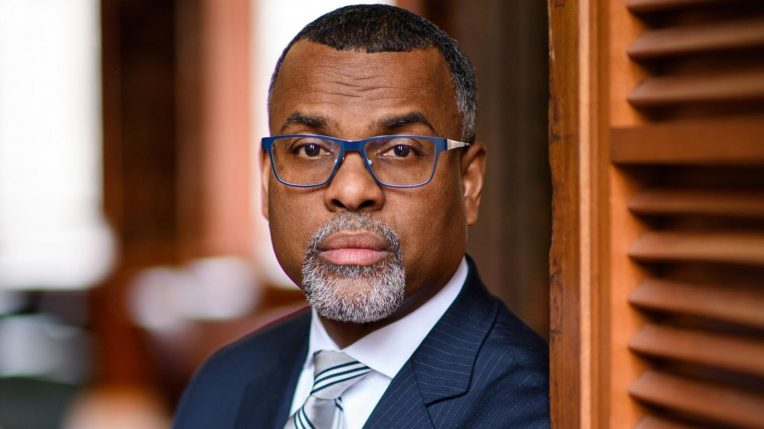Author and intellectual Dr. Eddie S. Glaude Jr. placed Dr. Martin Luther King Jr. within an American tradition that stretches back nearly 400 years and pointed to his relevance in the present crisis during his well-received keynote address for Illinois State University’s annual celebration of the civil rights icon.
Glaude Jr. spoke the night of January 14 about the stark reality facing the country during a 40-minute speech, titled “Democracy in Black,” and the 50-minute Q&A session that followed.
“We face a moral reckoning, a fundamental challenge to what we mean by ‘We the people’ in this moment,” Glaude Jr. said. “At the time of his death, Dr. King understood that if we are going to achieve our country, we would have to shatter the fables and myths that protect our national innocence, that we would have to confront the lies that give comfort to the status quo, that we would have to look in the mirror and finally see who and what is looking back at us.
“The last four years have ripped off the mask of this nation’s racial politics. All of the racial dog whistles and coded speech that had been a part of America’s politics have been tossed away for an explicit appeal to white America. What did we see on January 6? We saw a mob of white grievance, of white resentment, and white hatred. The genie is finally out of the bottle, and our task is not to push it back in, but to imagine the country without it, to imagine America as a truly multiracial democracy.”
Glaude Jr., the James S. McDonnell Distinguished University Professor and chair of the Department of African American Studies at Princeton University, said the attack on the U.S. Capitol January 6 was the “logical extension” of the reaction to the Black freedom movement of the mid-20th century.
“We’ve left behind a robust conception of citizenship for the idea that we are all self-interested persons in pursuit of our own aims and ends in competition and rivalry with others. In this context communal life is given away to gated communities and communities of hyper-concentrated poverty. … This was the reaction to the demand for a more racially just America, the dismantling of the Great Society, and a wholesale attack on the very framework of the New Deal. Our politics ever since has been overdetermined by the terrors and panic of the so-called forgotten American, and what we saw on the steps of the Capitol were those Americans in full revolt in the face of the prospect that their world is dying.”
Glaude Jr.’s presentation drew an estimated audience of 1,000 attendees via Zoom. He is well known for his books, including Democracy in Black: How Race Still Enslaves the American Soul and In a Shade of Blue: Pragmatism and the Politics of Black America, and for his roles as a columnist for Time Magazine and as a contributor to MSNBC.
His speech was preceded by shorter presentations by School of Communication Assistant Professor Dr. Byron Craig, Interim Assistant to the President for Diversity and Inclusion Dr. Doris Houston, University President Dr. Larry Dietz, Student Body President Lauren Harris, and Association of Residence Halls President Becca Gatliff. The celebration also featured a prerecorded performance by the Interdenominational Youth Choir and a poem reading by national award-winning student poet Naudia Williams. Angell Howard, coordinator for professional development in the Division of Student Affairs, facilitated the Q&A session.
The event was sponsored by the Office of the President, University Housing Services, and the Association of Residence Hall. Organizers moved the University’s annual celebration of Dr. Martin Luther King Jr. and Black History to a virtual format due to the coronavirus (COVID-19) pandemic. University Housing Services’ plans for a spring cultural dinner are tentative at this time.
Glaude Jr. spoke of how King is part of a long tradition of social criticism calling for America’s renewal of its founding ideals of democracy, freedom, and equality. “King stands then in a tradition which goes all the way back to John Winthrop’s famous sermon in 1630, ‘A Model of Christian Charity.’ There Winthrop exhorts the faithful to recognize that their success and eventually America’s success was contingent upon their obligations to God. If they turn their backs on God, Winthrop said, they would suffer the consequences and lose the bounty that was this new land.”
Glaude Jr. said King’s legacy has been used by some conservatives, liberals, and Black politicians for their own ends and to tell a simple version of his life, one that leaves out a genuine reckoning of the man. His national holiday can serve two purposes, Glaude Jr. said in his closing remarks.
“First, it can be our national commemoration of the tragedy of our racial past and present. King’s dream, especially today, calls attention to the enduring power of our principles and reveals I think his abiding faith in our nation’s capacity to be otherwise. … His dream unmasked America’s original sin, and we must be mindful of the sin of racism as we move forward into the future. …
“… The second thing that we can learn from this moment is that we ought to be reminded of how fragile our democracy is, that American democracy stands as an ideal towards which we strive and perhaps will never achieve. What better way to celebrate Dr. King’s prophetic witness than to remember that hubris darkens the soul and blinds us to a world in need. … Let’s fight for this democracy in this moment of storm and stress.”

